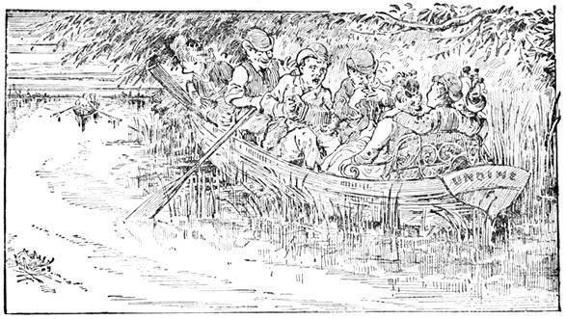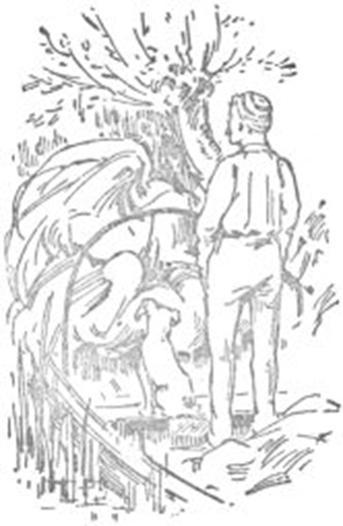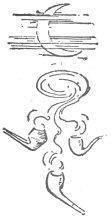Delphi Complete Works of Jerome K. Jerome (Illustrated) (Series Four) (16 page)
Read Delphi Complete Works of Jerome K. Jerome (Illustrated) (Series Four) Online
Authors: Jerome K. Jerome

The sweet sounds drew nearer, and soon the boat from which they were worked lay alongside us.
It contained a party of provincial ‘Arrys and ‘Arriets, out for a moonlight sail. (There was not any moon, but that was not their fault.) I never saw more attractive, lovable people in all my life. I hailed them, and asked if they could tell me the way to Wallingford lock; and I explained that I had been looking for it for the last two hours.
“Wallingford lock!” they answered. “Lor’ love you, sir, that’s been done away with for over a year. There ain’t no Wallingford lock now, sir. You’re close to Cleeve now. Blow me tight if ‘ere ain’t a gentleman been looking for Wallingford lock, Bill!”
I had never thought of that. I wanted to fall upon all their necks and bless them; but the stream was running too strong just there to allow of this, so I had to content myself with mere cold-sounding words of gratitude.
We thanked them over and over again, and we said it was a lovely night, and we wished them a pleasant trip, and, I think, I invited them all to come and spend a week with me, and my cousin said her mother would be so pleased to see them. And we sang the soldiers’ chorus out of
Faust
, and got home in time for supper, after all.

CHAPTER X.
Our first night. — Under canvas. — An appeal for help. — Contrariness of tea-kettles, how to overcome. — Supper. — How to feel virtuous. — Wanted! a comfortably-appointed, well-drained desert island, neighbourhood of South Pacific Ocean preferred. — Funny thing that happened to George’s father. — a restless night.
Harris and I began to think that Bell Weir lock must have been done away with after the same manner. George had towed us up to Staines, and we had taken the boat from there, and it seemed that we were dragging fifty tons after us, and were walking forty miles. It was half-past seven when we were through, and we all got in, and sculled up close to the left bank, looking out for a spot to haul up in.
We had originally intended to go on to Magna Charta Island, a sweetly pretty part of the river, where it winds through a soft, green valley, and to camp in one of the many picturesque inlets to be found round that tiny shore. But, somehow, we did not feel that we yearned for the picturesque nearly so much now as we had earlier in the day. A bit of water between a coal-barge and a gas-works would have quite satisfied us for that night. We did not want scenery. We wanted to have our supper and go to bed. However, we did pull up to the point—”Picnic Point,” it is called — and dropped into a very pleasant nook under a great elm-tree, to the spreading roots of which we fastened the boat.
Then we thought we were going to have supper (we had dispensed with tea, so as to save time), but George said no; that we had better get the canvas up first, before it got quite dark, and while we could see what we were doing. Then, he said, all our work would be done, and we could sit down to eat with an easy mind.
That canvas wanted more putting up than I think any of us had bargained for. It looked so simple in the abstract. You took five iron arches, like gigantic croquet hoops, and fitted them up over the boat, and then stretched the canvas over them, and fastened it down: it would take quite ten minutes, we thought.
That was an under-estimate.
We took up the hoops, and began to drop them into the sockets placed for them. You would not imagine this to be dangerous work; but, looking back now, the wonder to me is that any of us are alive to tell the tale. They were not hoops, they were demons. First they would not fit into their sockets at all, and we had to jump on them, and kick them, and hammer at them with the boat-hook; and, when they were in, it turned out that they were the wrong hoops for those particular sockets, and they had to come out again.
But they would not come out, until two of us had gone and struggled with them for five minutes, when they would jump up suddenly, and try and throw us into the water and drown us. They had hinges in the middle, and, when we were not looking, they nipped us with these hinges in delicate parts of the body; and, while we were wrestling with one side of the hoop, and endeavouring to persuade it to do its duty, the other side would come behind us in a cowardly manner, and hit us over the head.
We got them fixed at last, and then all that was to be done was to arrange the covering over them. George unrolled it, and fastened one end over the nose of the boat. Harris stood in the middle to take it from George and roll it on to me, and I kept by the stern to receive it. It was a long time coming down to me. George did his part all right, but it was new work to Harris, and he bungled it.
How he managed it I do not know, he could not explain himself; but by some mysterious process or other he succeeded, after ten minutes of superhuman effort, in getting himself completely rolled up in it. He was so firmly wrapped round and tucked in and folded over, that he could not get out. He, of course, made frantic struggles for freedom — the birthright of every Englishman, — and, in doing so (I learned this afterwards), knocked over George; and then George, swearing at Harris, began to struggle too, and got
himself
entangled and rolled up.

I knew nothing about all this at the time. I did not understand the business at all myself. I had been told to stand where I was, and wait till the canvas came to me, and Montmorency and I stood there and waited, both as good as gold. We could see the canvas being violently jerked and tossed about, pretty considerably; but we supposed this was part of the method, and did not interfere.
We also heard much smothered language coming from underneath it, and we guessed that they were finding the job rather troublesome, and concluded that we would wait until things had got a little simpler before we joined in.
We waited some time, but matters seemed to get only more and more involved, until, at last, George’s head came wriggling out over the side of the boat, and spoke up.
It said:
“Give us a hand here, can’t you, you cuckoo; standing there like a stuffed mummy, when you see we are both being suffocated, you dummy!”
I never could withstand an appeal for help, so I went and undid them; not before it was time, either, for Harris was nearly black in the face.
It took us half an hour’s hard labour, after that, before it was properly up, and then we cleared the decks, and got out supper. We put the kettle on to boil, up in the nose of the boat, and went down to the stern and pretended to take no notice of it, but set to work to get the other things out.
That is the only way to get a kettle to boil up the river. If it sees that you are waiting for it and are anxious, it will never even sing. You have to go away and begin your meal, as if you were not going to have any tea at all. You must not even look round at it. Then you will soon hear it sputtering away, mad to be made into tea.
It is a good plan, too, if you are in a great hurry, to talk very loudly to each other about how you don’t need any tea, and are not going to have any. You get near the kettle, so that it can overhear you, and then you shout out, “I don’t want any tea; do you, George?” to which George shouts back, “Oh, no, I don’t like tea; we’ll have lemonade instead — tea’s so indigestible.” Upon which the kettle boils over, and puts the stove out.
We adopted this harmless bit of trickery, and the result was that, by the time everything else was ready, the tea was waiting. Then we lit the lantern, and squatted down to supper.
We wanted that supper.
For five-and-thirty minutes not a sound was heard throughout the length and breadth of that boat, save the clank of cutlery and crockery, and the steady grinding of four sets of molars. At the end of five-and-thirty minutes, Harris said, “Ah!” and took his left leg out from under him and put his right one there instead.
Five minutes afterwards, George said, “Ah!” too, and threw his plate out on the bank; and, three minutes later than that, Montmorency gave the first sign of contentment he had exhibited since we had started, and rolled over on his side, and spread his legs out; and then I said, “Ah!” and bent my head back, and bumped it against one of the hoops, but I did not mind it. I did not even swear.
How good one feels when one is full — how satisfied with ourselves and with the world! People who have tried it, tell me that a clear conscience makes you very happy and contented; but a full stomach does the business quite as well, and is cheaper, and more easily obtained. One feels so forgiving and generous after a substantial and well-digested meal — so noble-minded, so kindly-hearted.
It is very strange, this domination of our intellect by our digestive organs. We cannot work, we cannot think, unless our stomach wills so. It dictates to us our emotions, our passions. After eggs and bacon, it says, “Work!” After beefsteak and porter, it says, “Sleep!” After a cup of tea (two spoonsful for each cup, and don’t let it stand more than three minutes), it says to the brain, “Now, rise, and show your strength. Be eloquent, and deep, and tender; see, with a clear eye, into Nature and into life; spread your white wings of quivering thought, and soar, a god-like spirit, over the whirling world beneath you, up through long lanes of flaming stars to the gates of eternity!”
After hot muffins, it says, “Be dull and soulless, like a beast of the field — a brainless animal, with listless eye, unlit by any ray of fancy, or of hope, or fear, or love, or life.” And after brandy, taken in sufficient quantity, it says, “Now, come, fool, grin and tumble, that your fellow-men may laugh — drivel in folly, and splutter in senseless sounds, and show what a helpless ninny is poor man whose wit and will are drowned, like kittens, side by side, in half an inch of alcohol.”
We are but the veriest, sorriest slaves of our stomach. Reach not after morality and righteousness, my friends; watch vigilantly your stomach, and diet it with care and judgment. Then virtue and contentment will come and reign within your heart, unsought by any effort of your own; and you will be a good citizen, a loving husband, and a tender father — a noble, pious man.
Before our supper, Harris and George and I were quarrelsome and snappy and ill-tempered; after our supper, we sat and beamed on one another, and we beamed upon the dog, too. We loved each other, we loved everybody. Harris, in moving about, trod on George’s corn. Had this happened before supper, George would have expressed wishes and desires concerning Harris’s fate in this world and the next that would have made a thoughtful man shudder.
As it was, he said: “Steady, old man; ‘ware wheat.”
And Harris, instead of merely observing, in his most unpleasant tones, that a fellow could hardly help treading on some bit of George’s foot, if he had to move about at all within ten yards of where George was sitting, suggesting that George never ought to come into an ordinary sized boat with feet that length, and advising him to hang them over the side, as he would have done before supper, now said: “Oh, I’m so sorry, old chap; I hope I haven’t hurt you.”

And George said: “Not at all;” that it was his fault; and Harris said no, it was his.
It was quite pretty to hear them.